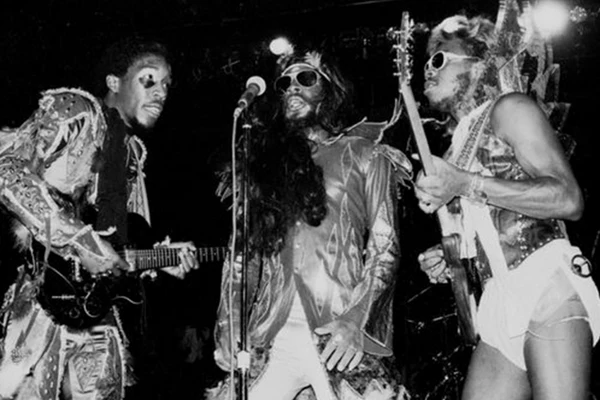
Music, or art in general I suppose, works best when it limits the information given to the listener. When something doesn’t tell you how or what to feel your mind tends to wander. It’s how most classic albums breed, off the disparity between the listeners reactions. There are musicians who defy the rule though, Kendrick Lamar being a great recent example of an artist who shows all, tells all and yet creates a seminal work adored by the masses. Many great bands however function off their creativity as a facilitator to get brainwaves vibrating and minds contemplating. While they spent the bulk of their discography defining what exactly Funk is, Funkadelic, when at their best, thrived off this forced illusion. P-Funk was everything you expected, along with everything you didn’t. If that weren’t the case there’d be no way to describe Maggot Brain. It breaches contract with a litany of styles, forgoing complacency in an attempt at allowing the genre Funkadelic defined to be a glorified catch-all. Their most noted work, released in the peak of their dominance, stands the test of time due to this near impossible coercion between understanding and aloofness, never giving the listener an answer as to what they’re doing whilst simultaneously doing their best to explain it.
Still undetermined to me whether it’s a sound move, Funkadelic’s album structures sidestepped redundancy to provide a handful of Funky anthems sandwiched by broodingly long pieces of drawling anguish. Maggot Brain provides the best indicator to this thesis, pushing five songs that never escape the four minute mark together around two 10-minute behemoths. Those behemoths, ‘Maggot Brain’ and ‘War Of Armageddon,’ contradict each other in ways that can only be seen as intentional, the former moving exhaustively slow as Eddie Hazel pours his soul out on his guitar, the latter moving disgustingly fast, parading around a series of nonsensical sound montages that range from righteous political speeches to fart noises. It’s a beautiful concept, one that gives worth and meaning to the otherwise flighty funky rhythms packed within. Without them the piece turns into a singles montage unmindful of the power the music holds. But thanks to these outrageous Experimental rendezvous’ Maggot Brain feels mightily important, like an album aware of its influence that’ll dominate the coming decades. While later albums from the collective festered deeper in political and racial hopes and desires, ‘Wars Of Armageddon’ and other spots here like ‘You And Your Folks, Me And My Folks’ acknowledged the disparity, making Maggot Brain a seminal work in the continued rise of the union between black righteousness and Funk.
When it doesn’t aspire to conquer a movement, Maggot Brain provides some of the greatest Funk and Rock anthems known to man. ‘Can You Get To That’ stands atop the totem pole in this regard, strewing itself with earworms with every sound included. The strumming acoustics, sampled wonderfully by Sleigh Bells in ‘Rill Rill’, the Gospel-influenced chorus that brought half a dozen members in unison, the George Clinton-performed “I wanna know” lurking under the shadows, all just some examples of the supreme catchiness on display here. At times the urges of pressing unforgettable moments becomes overbearing, with each track, apart from ‘You And Your Folks’ which I feel falters in its execution, attempting to one-up the former with how delectable they can be. ‘Hit It & Quit It’ springs to life, purposefully, in the hook thanks to Bernie Worrell’s blaring vocals, and yet the catchiest parts resides in the backing track as Soulful chants and rhythmic guitars dance around Worrell’s pouncing lyrics. Elsewhere, like on ‘Back In Our Minds,’ the Funkiness reaches the expected bottleneck, as cooky instrumentation spirals out of control behind the rousing vocals from Clinton and Tawl Ross. It isn’t until McKinley Jackson’s short-lived trombone solo at the end where order is restored.
Back to the illusion of knowledge Maggot Brain so inconspicuously engrains within its music. Whether it’s the despairing title track that leads one to believe the world’s saddest Funk album is to follow, or the bevy of uplifting tunes centered around toilsome life events, whether it be a drug addiction as seen on ‘Super Stupid’ or interracial love on ‘Back In Our Minds,’ or the bizarro sound collage to close things out, Maggot Brain continuously challenges the listeners understanding of its presence. Around every crackling of the vinyl there’s a new beast to encounter. They don’t always come loud and abrasive though, emotive resonance pours from the sweat off the instruments lingering underneath, like on ‘Maggot Brain’ where Clinton himself hushed the slew of percussions bubbling underneath Hazel’s solo, determined to provide ensuing despondence when one looks past the reckoning on top. Even when the music is uplifting the same can be seen. On ‘Wars Of Armageddon’ you’ll never fully scour the surface as a litany of vibrations pile on, like a hodgepodge of artists told to throw everything on the table. Some of its foolish, others is deafly serious. Regardless the end product is culturally relishing, spitting out 1971 relevancy in propaganda form with intense fervor.
Maggot Brain doesn’t always land though, as mentioned before ‘Your And Your Folks’ seems distinctly bland in comparison to its surroundings, providing nothing that the others aren’t already doing better. And while all its other tracks each have something magnificent thrown about, some pieces drag on too long for their own good. Small quips aside, this is Funkadelic’s most critically-acclaimed release for a reason. Throughout a discography that spanned two concurrent bands, Maggot Brain stands out for its sheer audacity, combing over everything that made their dominance worthwhile. From the freeform improvisation that filled their early pieces, to the refined concentration of their latter, Maggot Brain has it all, seeing a batch of incredibly talented artists at the middle of their own crossroads. There’s enough variety, as experimental masterpieces bookend some of the funkiest anthems known to man, all within the span of 37 robust minutes.




No comments:
Post a Comment